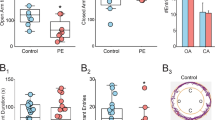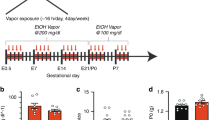Abstract
Rationale
Prenatal exposure to alcohol can disrupt brain development, leading to a variety of behavioral alterations, including learning deficits. We have postulated that some central nervous system damage may be due to N-methyl-d-aspartate (NMDA) receptor-mediated excitotoxicity that occurs during ethanol withdrawal. Consistent with this hypothesis, we previously demonstrated that administration of MK-801, an NMDA receptor antagonist, during ethanol withdrawal attenuates ethanol-related learning deficits using an animal model of fetal alcohol effects. However, MK-801 binds to the phencyclidine site, which affects all NMDA receptor subtypes and can cause adverse side effects and toxicity. Eliprodil is a more selective NMDA receptor antagonist that acts at the polyamine modulatory site of NMDA receptors.
Objectives
The purpose of this study was to determine if administration of eliprodil during ethanol withdrawal would reduce the severity of learning deficits associated with developmental alcohol exposure.
Methods
Male rat pups were randomly assigned to ethanol-exposed or control treatments. On postnatal day (PD) 6, during a period of brain development similar to that of the mid-third trimester in humans, subjects were exposed to 6.0 g/kg ethanol or isocaloric maltose solutions via oral gavage. Twenty-four hours after the end of the ethanol treatment, during ethanol withdrawal, all subjects received an intraperitoneal injection of one of three doses of eliprodil (5, 10, or 25 mg/kg) or vehicle. On PD 40, all subjects were tested on a serial spatial discrimination reversal learning task.
Results
Ethanol-exposed subjects treated with vehicle committed a significantly greater number of errors compared to controls. Administration of eliprodil during ethanol withdrawal significantly decreased the number of errors in the ethanol-exposed groups, but had no significant effect on the performance of controls.
Conclusion
These data support the hypothesis that NMDA receptor-mediated excitotoxicity during ethanol withdrawal contributes to fetal alcohol effects.




Similar content being viewed by others
References
Allgaier C (2002) Ethanol sensitivity of NMDA receptors. Neurochem Int 41:377–382
Avenet P, Leonardon J, Besnard F, Graham D, Depoortere H, Scatton B (1997) Antagonist properties of eliprodil and other NMDA receptor antagonists at rat NR1A/NR2A and NR1A/NR2B receptors expressed in Xenopus oocytes. Neurosci Lett 223:133–136
Bath CP, Farrell LN, Gilmore J, Ward MA, Hicks CA, O’Neill MJ, Bleakman D (1996) The effects of ifenprodil and eliprodil on voltage-dependent Ca2+ channels and in gerbil global cerebral ischaemia. Eur J Pharmacol 299:103–112
Biton B, Granger P, Carreau A, Depoortere H, Scatton B, Avenet P (1994) The NMDA receptor antagonist eliprodil (SL 82.0715) blocks voltage-operated Ca2+ channels in rat cultured cortical neurons. Eur J Pharmacol 257:297–301
Crews FT, Morrow AL, Criswell H, Breese G (1996) Effects of ethanol on ion channels. Int Rev Neurobiol 39:283–367
Davidson M, Shanley B, Wilce P (1995) Increased NMDA-induced excitability during ethanol withdrawal: a behavioural and histological study. Brain Res 674:91–96
Dildy-Mayfield JE, Leslie SW (1991) Mechanisms of inhibition of N-methyl-d-aspartate-stimulated increases in free intracellular calcium by ethanol. J Neurochem 56:1536–1543
Dobbing J, Sands J (1979) Comparative aspects of the brain growth spurt. Early Hum Dev 3:79–83
Goldstein DB (1986) The alcohol withdrawal syndrome: a view from the laboratory. In: Galanter M (ed) Recent developments in alcoholism, vol 4. Plenum Press, New York, pp 231–240
Goodlett CR, Horn KH (2001) Mechanisms of alcohol-induced damage to the developing nervous system. Alcohol Res Health 25:175–184
Goodlett CR, Johnson TB (1997) Neonatal binge ethanol exposure using intubation: timing and dose effects on place learning. Neurotoxicol Teratol 19:435–446
Grant KA (1990) Ethanol withdrawal seizures and the NMDA receptor complex. Eur J Pharmacol 176:289–296
Gulya K, Grant KA, Valverius P, Hoffman PL, Tabakoff B (1991) Brain regional specificity and time-course of changes in the NMDA receptor-ionophore complex during ethanol withdrawal. Brain Res 547:129–134
Hoffman PL (1995) Effects of alcohol on excitatory amino acid receptor function. In: Kranzler HR (ed) The pharmacology of alcohol abuse. Spring-Verlag, New York, pp 75–102
Hoffman PL, Tabakoff B (1994) The role of the NMDA receptor in ethanol withdrawal. In: Jansson B, Jornvall H, Rydberg U, Terenius L, Vallee BL (eds) Toward a molecular basis of alcohol use and abuse. Birkhause Verlag, Basel Switzerland, pp 61–70
Hu XJ, Follesa P, Ticku MJ (1996) Chronic ethanol treatment produces a selective upregulation of the NMDA receptor subunit gene expression in mammalian cultured cortical neurons. Brain Res Mol Brain Res 36:211–218
Ikonomidou C, Mosinger JL, Salles KS, Labruyere J, Olney JW (1989) Sensitivity of the developing rat brain to hypobaric/ischemic damage parallels sensitivity to N-methyl-aspartate neurotoxicity. J Neurosci 9:2809–2818
Ikonomidou C, Bosch F, Miksa M, Bittigau P, Vockler J, Dikranian K, Tenkova TI, Stefovska V, Turski L, Olney JW (1999) Blockade of NMDA receptors and apoptotic neurodegeneration in the developing brain. Science 283:70–74
Johnston MV (1994) Developmental aspects of NMDA receptor agonists and antagonists in the central nervous system. Psychopharmacol Bull 30:567–575
Kotlinska J, Liljequist S (1996) Oral administration of glycine and polyamine receptor antagonists blocks ethanol withdrawal seizures. Psychopharmacology 127:238–244
Kotlinska J, Liljequist S (1997) The NMDA/glycine receptor antagonist, L-701,324, produces discriminative stimuli similar to those of ethanol. Eur J Pharmacol 332:1–8
Lovinger DM (1993) Excitotoxicity and alcohol-related brain damage. Alcohol Clin Exp Res 17:19–27
Lovinger DM (1995) Developmental decrease in ethanol inhibition of N-methyl-d-aspartate receptors in rat neocortical neurons: relation to the actions of ifenprodil. J Pharmacol Exp Ther 274:164–172
Lovinger DM, White G, Weight FF (1989) Ethanol inhibits NMDA-activated ion current in hippocampal neurons. Science 243:1721–1724
Mattson SN, Riley EP (1998) A review of the neurobehavioral deficits in children with fetal alcohol syndrome or prenatal exposure to alcohol. Alcohol Clin Exp Res 22:279–294
McDonald JW, Silverstein FS, Johnston MV (1990) MK-801 pretreatment enhances N-methyl-d-aspartate-mediated brain injury and increases brain N-methyl-d-aspartate recognition site binding in rats. Neuroscience 38:103–113
Morito T, Sonoda R, Nakato K, Koshiya K, Wanibuchi F, Yamaguchi T (2000) Phencyclidine-induced abnormal behaviors in rats as measured by the hole board apparatus. Psychopharmacology 148:281–288
NIAAA (2000) 10th Special Report to US Congress on Alcohol and Health. National Institute of Health, Washington D.C.
Patat A, Molinier P, Hergueta T, Brohier S, Zieleniuk I, Danjou P, Warot D, Puech A (1994) Lack of amnestic, psychotomimetic or impairing effect on psychomotor performance of eliprodil, a new NMDA antagonist. Int Clin Psychopharmacol 9:155–162
Reyes M, Reyes A, Opitz T, Kapin MA, Stanton PK (1998) Eliprodil, a non-competitive, NR2B-selective NMDA antagonist, protects pyramidal neurons in hippocampal slices from hypoxic/ischemic damage. Brain Res 782:212–218
Riley EP, Barron S, Hannigan JH (1986) Response inhibition deficits following prenatal alcohol exposure: a comparison of the effects of hippocampal lesions in rats. In: West JR (ed) Alcohol and brain development. Oxford University Press, New York, pp 71–102
Roebuck TM, Mattson SN, Riley EP (1998) A review of the neuroanatomical findings in children with fetal alcohol syndrome or prenatal exposure to alcohol. Alcohol Clin Exp Res 22:339–344
Sanger DJ (1992) NMDA antagonists disrupt timing behaviour in rats. Behav Pharmacol 3:593–600
Smothers CT, Clayton R, Blevins T, Woodward JJ (2001) Ethanol sensitivity of recombinant human N-methyl-d-aspartate receptors. Neurochem Int 38:333–340
Svensson TH (2000) Dysfunctional brain dopamine systems induced by psychotomimetic NMDA-receptor antagonists and the effects of antipsychotic drugs. Brain Res Rev 31:320–329
Thomas JD, Esparza CM, Moritz DE, Lopez G, Wasserman EA, West JR (1995) Alcohol-induced behavioral deficits and regional brain weight reductions depend on timing of alcohol exposure during the neonatal brain growth spurt in rats. Soc Neurosci Abstr 21:2097
Thomas JD, Weinert SP, Sharif S, Riley EP (1997) MK-801 administration during ethanol withdrawal in neonatal rat pups attenuates ethanol-induced behavioral deficits. Alcohol Clin Exp Res 21:1218–1225
Thomas JD, Fleming SL, Riley EP (2001) MK-801 can exacerbate or attenuate behavioral alterations associated with neonatal alcohol exposure in the rat, depending on the timing of administration. Alcohol Clin Exp Res 25:764–773
Thomas JD, Edwards RB, CHen W-JA (2002a) MK-801 administered during withdrawal attenuates hippocampal CA1 pyramidal cell loss in rats neonatally exposed to alcohol. Alcohol Clin Exp Res 26:134A
Thomas JD, Fleming SL, Riley EP (2002b) Administration of low doses of MK-801 during ethanol withdrawal in the developing rat pup attenuates alcohol’s teratogenic effects. Alcohol Clin Exp Res 26:1307–1313
Thomas MP, Monaghan DT, Morrisett RA (1998) Evidence for a causative role of N-methyl-d-aspartate receptors in an in vitro model of alcohol withdrawal hyperexcitability. J Pharmacol Exp Ther 287:87–97
Toulmond S, Serrano A, Benavides J, Scatton B (1993) Prevention by eliprodil (SL 82.0715) of traumatic brain damage in the rat. Existence of a large (18 h) therapeutic window. Brain Res 620:32–41
Verma A, Moghaddam B (1996) NMDA receptor antagonists impair prefrontal cortex function as assess via spatial delayed alternation performance in rats: modulation by dopamine. J Neurosci 16:373–379
Wedzony K, Mackowiak M., Zajaczkowski W, Fijal K, Chocyk A, Czyrak A (2000) WAY 100135, an antagonist of 5-HT1A serotonin receptors, attenuates psychotomimetic effects of MK-801. Neuropsychopharmacology 23:547–559
Wenzel AF, Mohler H, Benke D (1997) NMDA receptor heterogeneity during postnatal development of the rat brain: differential expression of the NR2A, NR2B, and NR2C subunit proteins. J Neurochem 68:469–478
West JR, Hamre KM, Pierce DR (1984) Delay in brain growth induced by alcohol in artificially reared rat pups. Alcohol 1:213–222
West JR, Chen WJ, Pantazis NJ (1994) Fetal alcohol syndrome: the vulnerability of the developing brain and possible mechanisms of damage. Metab Brain Dis 9:291–322
Whittemore ER, Ilyin VI, Woodward RM (1997) Antagonism of N-methyl-d-aspartate receptors by sigma site ligands: potency, subtype-selectivity and mechanisms of inhibition. J Pharmacol Exp Ther 282:326–338
Yang X, Criswell HE, Simson P, Moy S, Breese GR (1996) Evidence for a selective effect of ethanol on N-methyl-d-aspartate responses: ethanol affects a subtype of the ifenprodil-sensitive N-methyl-d-aspartate receptors. J Pharmacol Exp Ther 278:114–124
Acknowledgements
This study was supported by NIAAA Grant AA06902.
Author information
Authors and Affiliations
Corresponding author
Rights and permissions
About this article
Cite this article
Thomas, J.D., Garcia, G.G., Dominguez, H.D. et al. Administration of eliprodil during ethanol withdrawal in the neonatal rat attenuates ethanol-induced learning deficits. Psychopharmacology 175, 189–195 (2004). https://doi.org/10.1007/s00213-004-1806-x
Received:
Accepted:
Published:
Issue Date:
DOI: https://doi.org/10.1007/s00213-004-1806-x




